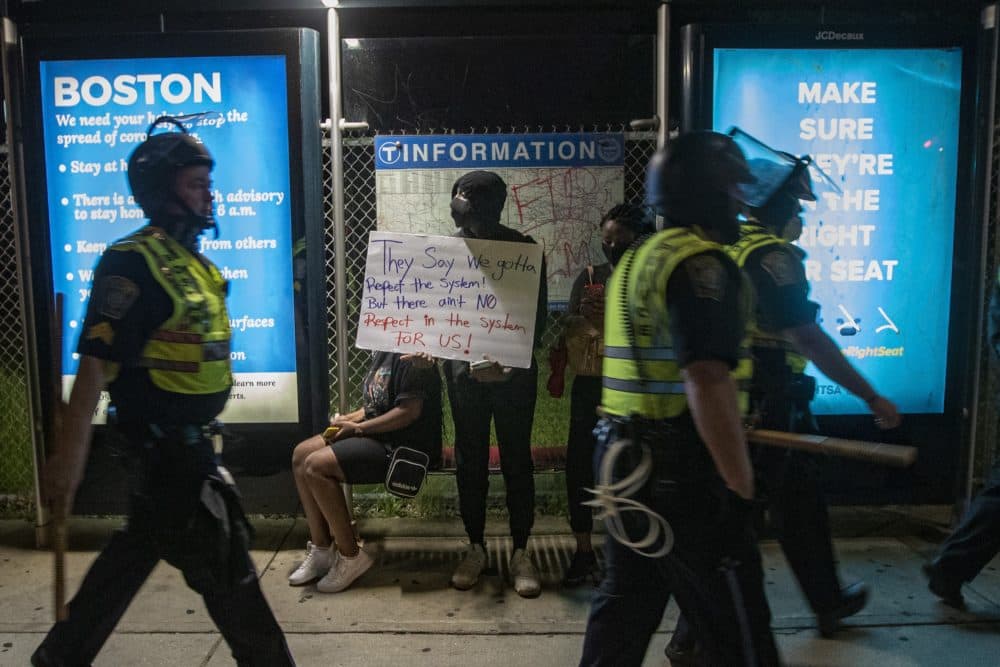Advertisement
'We're Tired Of Being Scared': Bostonians Who Have Had Close Encounters With Police Say It's Time For A Change
Resume
At a recent public forum held on Zoom, a group of young men who have had direct contact with Boston police gathered to talk about policing, racism and the path forward.
"We're tired of being scared — and this might be the only moment when we're taken seriously," said Germaine Taylor, who helped moderate the forum amid national protests demanding an end to police brutality after the killing of George Floyd.
The forum was organized by InnerCity Weightlifing (ICW), a non-profit founded in Boston in 2010 with a simple mission: to keep young people away from gun violence and out of the criminal justice system. Today, it trains young men who have been incarcerated to become fitness coaches.
Taylor and the coaches at the forum have done time in prison for offenses like dealing drugs and gun charges. So, they've had their share of encounters with cops — and had a visceral reaction to the killing of George Floyd and the protests that followed.
"I think the protest needed to be done," said Joe Sierra, who grew up in Boston and is a trainer at ICW. "It needed to be done, and we're out of time, and we're sick of it."
Sierra pointed out that the death of George Floyd was only the latest in a long line of police killings of Black people, which includes Michael Brown, Freddie Gray, Eric Garner, Philando Castile and Alton Sterling, among many others.
"If you want to kill someone and get away with it, just become a police officer," Sierra said. "All it takes is to hold the police officers accountable for the crimes they commit. Now people see riots and they're surprised."
Germaine Taylor said people have been trying unsuccessfully to blow the whistle on police abuse for years.
"Colin Kaepernick was kneeling four or five years ago, and he lost his job for it," Taylor said. "They ridiculed him, they criticized him, they dragged him through the mud. They said he disrespected the flag — all kinds of nonsense — when he was just trying to bring awareness to police brutality."
The coaches at ICW say they have felt the sharp end of the spear of aggressive policing — so they have real, raw anger. That doesn't surprise those who have watched that anger build over the years.
"People are fed up," said Suffolk County District Attorney Rachael Rollins, who spoke last week following protests in Boston. "And to the white community that is now waking up to see this rage, we have been telling you this forever. ... You didn't care until you saw a video."
That video of officer Derek Chauvin pressing his knee into the neck of George Floyd for more than eight minutes has sparked protests around the world — and a movement. But at the ICW public forum, trainer Etanis Cumba was skeptical that it will bring real change — because, he said, we've seen these videos before.
"They're killing us slowly on camera," Cumba said. "You got a guy screaming, saying he can't breathe. So, cameras don't help us."
Cumba said what will help is for people, including white people, to step in and intervene.
"I don't care who the person is getting abused by a cop — it could be a white person. I will step in [and stop it]. I'm tired of it."
Cumba expressed skepticism that cops are willing to change. But what about the ones expressing shows of solidarity with protestors, like taking a knee? Cumba said they have to do more.
"It's a lot easier for ... white people to look at the murder on TV and say, 'that's wrong.' But will they fight with the same fervor to give people a livable wage, access to proper housing, access to health care?"
"[Police are] there to protect me," Cumba said. "If I'm being attacked by your fellow officer, then what are you doing, as a cop? There is no good cop in my eyes until cops start separating themselves from each other and saying, 'we stand with you against those guys,' and start taking seriously the protect-and-serve part. Until then, I'm going to protect myself and serve my community."
As the forum neared its conclusion, Feliciano Tavares, the chief program officer at ICW, summed up the event succinctly. "What you heard tonight was raw emotion."
Some 350 people watched the forum, many of whom were white. Tavares challenged them to care not only about the tragic killing of George Floyd, but also about the pervasive inequality that allowed it.
"When I hear 'Black lives matter,' I want to focus on the 'lives' part, [rather than] making us martyrs when we're gunned down by the police," Tavares said. "It's a lot easier for ... white people to look at the murder on TV and say, 'that's wrong.' But will they fight with the same fervor to give people a livable wage, access to proper housing, access to health care? These inequities — that's where I would love the conversation to go."
If the conversation does go there — and stays there - it might address not only problems with policing, but also the deeper inequities brought to the fore by the coronavirus pandemic.
